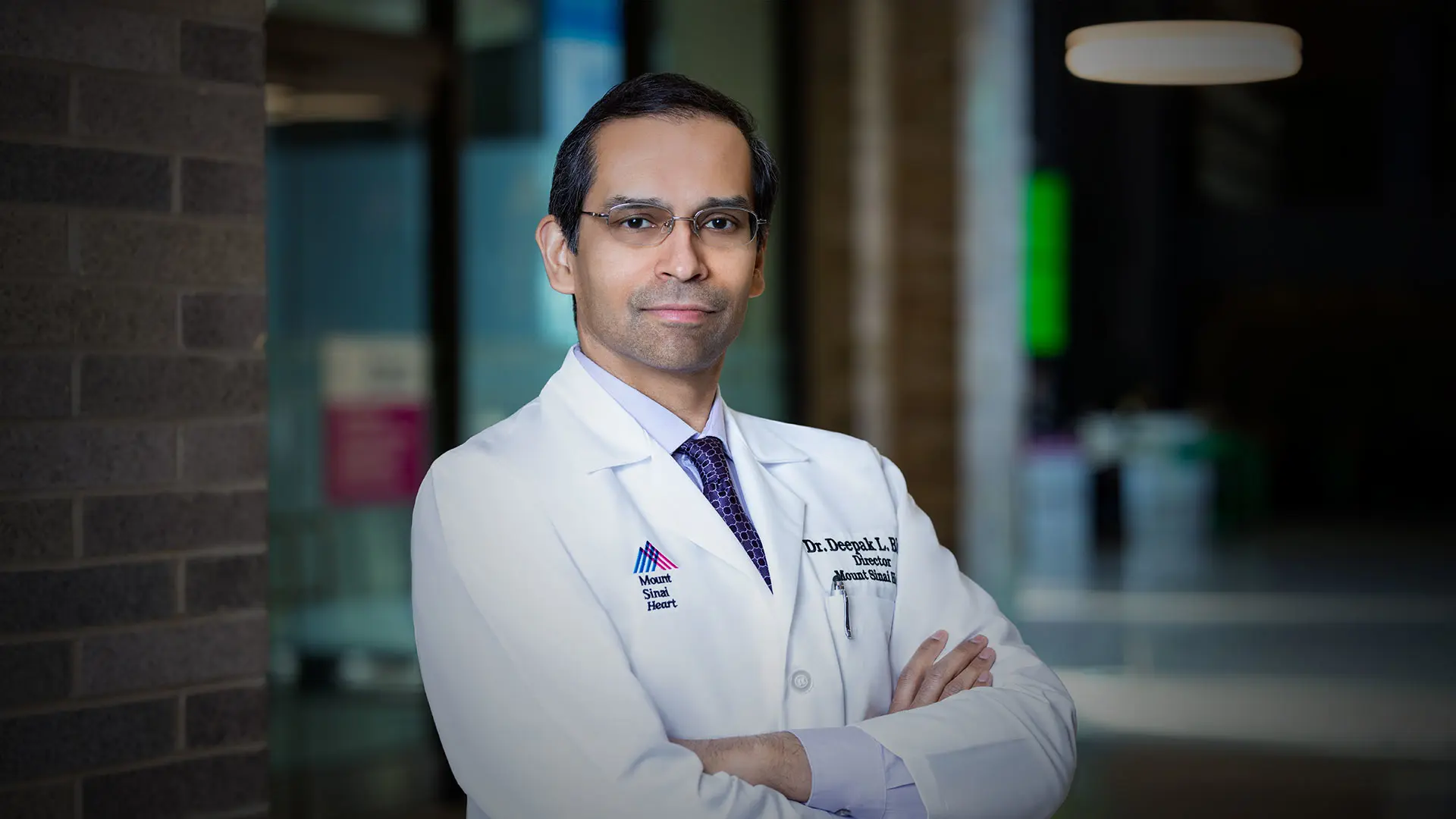In one of his many achievements, the cardiovascular polypill, which was developed under Dr. Fuster’s leadership, was placed on the List of Essential Medicines by the World Health Organization in 2023.
The Mount Sinai Hospital was ranked No. 1 in New York and No. 4 in the nation for Cardiology, Heart and Vascular Surgery by U.S. News & World Report® for 2023-24, and No. 1 in New York and No. 4 globally on Newsweek's list of the top 20 cardiology hospitals in the world. In this landmark year, our physicians and scientists made a series of advances that would each be outstanding on their own.
A team led by David H. Adams, MD, Marc Miller, MD, Maria Giovanna Trivieri, MD, PhD, and Zahi Fayad, MD, PhD, was awarded a $10.2 million grant from the National Heart, Lung, and Blood Institute to investigate risk factors for malignant arrhythmias in mitral valve prolapse. Even as they study the condition, these renowned doctors are making it a priority to raise awareness among both physicians and patients about its hidden risks.
For Vivek Reddy, MD, years of research and clinical work came to fruition when the U.S. Food and Drug Administration approved a dual-chamber leadless pacemaker, and Dr. Reddy implanted the groundbreaking device in a 69-year-old patient, making the Mount Sinai Fuster Heart Hospital the first in New York City and one of the first in the nation to offer the device.
In another milestone, a team of Mount Sinai cardiovascular surgeons, led by Ismail El-Hamamsy, MD, PhD, performed 100 successful Ross procedures in 2023. Our program, a renowned leader in the field, became the first to achieve this milestone in a single year.
The Mount Sinai Hospital’s Cardiac Catheterization Laboratory, in addition to excelling in safety and volume, pioneered two innovative procedures with a team led by Samin K. Sharma, MD, and Annapoorna S. Kini, MD. The first involved employing the world’s smallest heart pump system to provide temporary mechanical circulatory support during high-risk PCI. The second procedure, performed with Prakash Krishnan, MD, and George Dangas, MD, PhD, treated a patient’s uncontrolled high blood pressure with a groundbreaking renal denervation system.
We continue to advance cardiology in both fundamental and translational research. The Cardiovascular Research Institute, led by Filip K. Swirski, PhD, made discoveries in lifestyle and prevention, systems physiology and bioengineering, and genetic medicine, including a mechanistic study by Dr. Swirski, which found that fasting may be detrimental to fighting off infection. And a multidisciplinary project led by Dr. Fayad that is studying the effects of psychosocial stress on cardiovascular disease won renewal of an $11.5 million award from the National Heart, Lung, and Blood Institute.
The multicenter COAPT study, led by Gregg Stone, MD, found that transcatheter mitral valve repair for heart failure patients with mitral regurgitation can reduce the long-term rate of hospitalizations by almost 50 percent, and death by nearly 30 percent, compared with heart failure patients who don’t undergo the procedure.
“I wish you the best in your own practice and invite you to peruse this report, which highlights the dedicated work of Mount Sinai Fuster Heart Hospital in cardiology, cardiac surgery, and research.”
A series of trials led by Robert S. Rosenson, MD, is investigating the therapeutic pathway targeting angiopoietin-like protein 3 in treating a wide range of patients with hypercholesterolemia. And the Yellow III trial, led by Dr. Kini, offered evidence that aggressive lipid lowering with a PCSK9 inhibitor, along with a statin, can significantly reduce that threat and help doctors identify patients who would benefit most from treatment to change their coronary plaque morphology and composition.
And I am proud to launch the TRANSFORM trial, a multisite—and possibly paradigm-shifting—study that will assess whether pairing coronary CT angiography with an AI-enabled algorithm to classify the build-up of atherosclerotic plaque into stages in patients before they have suffered a heart attack is superior to the standard of care.
Equitable and compassionate patient care is always top of mind at Mount Sinai Fuster Heart Hospital. Amy Kontorovich, MD, PhD, Sean Pinney, MD, and a wide-ranging team of experts are working together to improve education, diagnosis, and treatment for people with hereditary transthyretin amyloidosis cardiomyopathy. This genetic condition significantly increases the risk of heart disease and disproportionately affects African American and LatinX people.
Our internationally recognized Cardiovascular Training Program, under the guidance of Martin Goldman, MD, attracts exceptional, diverse candidates from the leading institutions in the country, who become future leaders in cardiovascular medicine. And we continue to take leadership positions among our peers, as Dr. Dangas was named President of the Society for Cardiovascular Angiography and Interventions, and Dr. El-Hamamsy was named President of the Heart Valve Society.
I wish you the best in your own practice and invite you to peruse this report, which highlights the dedicated work of Mount Sinai Fuster Heart Hospital in cardiology, cardiac surgery, and research.
Deepak L. Bhatt, MD, MPH, MBA
Director of Mount Sinai Fuster Heart Hospital
